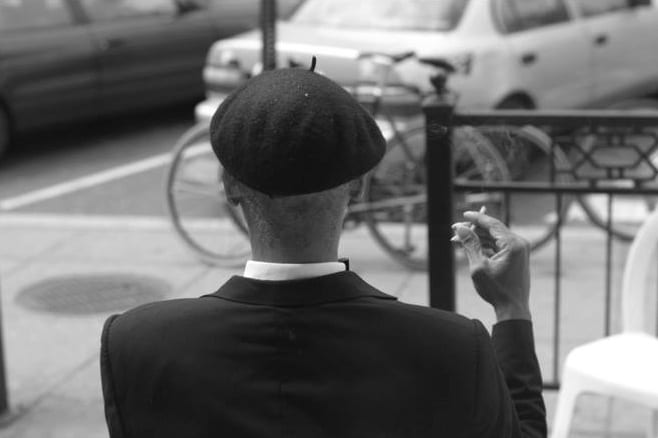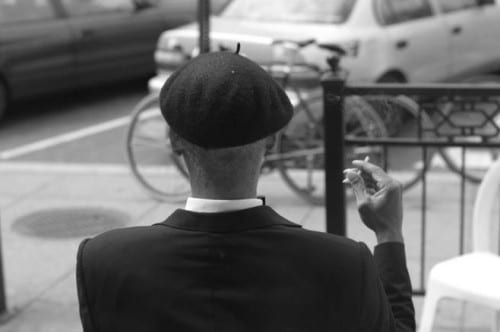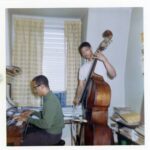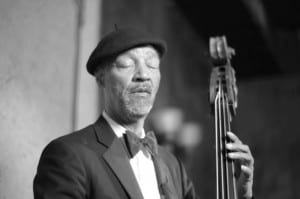Appreciation | Lessons from Mr. Warren


by Lyle Link
Special contributor
I hated him back then. And though it took place many years ago, I can still recall the incident as if it happened only yesterday.
It was a Sunday night, and I couldn’t wait to play my saxophone at the weekly jam session at Twins Lounge. I walked down the street with urgency. The dry leaves crunched under my sneakers as I hurried along the cracked asphalt of the sidewalk, a cool evening breeze blowing across my forehead, an orange, fall moon hanging low in the starless night sky. My moist fingers clutched the wooden handle of my saxophone case, my stomach a flock of butterflies.
I was twenty-one and badly wanted to learn to play like my idols: saxophonists Charlie Parker, Dexter Gordon and John Coltrane. How could they play the way they did? I wondered. How did they bring those oddly shaped pieces of metal to life? Eyes closed, with no sheet music in front of them, producing those beautiful melodies, as if they had channeled them from some other, mysterious realm. Or maybe, just maybe, they created the music themselves. Perhaps it came out of them, out of the depths of their experiences, their instruments just a mere vehicle for them to transfer what they were thinking and feeling, and hearing in their heads. However they did it, I knew that that was what I wanted to be able to do.
 Obituary: Butch Warren
Obituary: Butch WarrenThe bass great spent less than five years on the national stage, but he made his mark with the greats: Thelonious Monk, Herbie Hancock. And as an elder statesman in D.C., his presence carried weight.
I had been going to the session regularly on Sunday nights and, though terrified most of the time, I looked forward to being able to try out the things I had been working on at home and in the practice rooms at school.
As I walked toward the neighborhood club, I could hear the faint sounds of music drifting through the air. Getting closer, the volume seemed to increase with each step.
I finally got to the corner of Colorado Avenue and Longfellow Street. I could hear the block chords of the piano, the steady thump and pulse of the bass, and the pop and tang of the drums. Standing outside the club, I could tell that there was a good crowd. I could hear people talking and clapping while the band played. I turned the brass doorknob, pulled the old, creaky, wooden door toward me, and entered the dimly lit bar.
The room was small, and because of its size there wasn’t really a bad seat in the house. Walking in, you could see the bandstand to the left, and chairs and tables were packed in, right up to the foot-high stage. The place was packed, smoke rising from the orange embers of cigarettes peppered throughout the room.
A grand piano claimed most of the stage. The drum set occupied the opposite end, an upright bass nestled in between, and together the three formed the sacred trinity known as the jazz rhythm section. This house band trio usually opened the set with a few pieces, after which horn players and vocalists would be invited to sit in.
I listened carefully. From the chord changes, I could tell that it was a rendition of “Just Friends,” the 1931 song written by John Klenner and Sam M. Lewis that had become a jazz standard. I first heard it played by Charlie Parker, on the famous Bird With Strings record I had.
The bearded pianist’s head hung low, hovering just above the keyboard, his fingers adeptly negotiating the black and white ivory keys. Eyes shut, he mouthed the tones he played in unison with the notes that sprung from under the lid of the piano, the small hammers doing their work in the darkness of the body of the Kawai. The bassist winced as he pulled the strings of the upright, as if the instrument demanded a bit of pain, as well as skill, for it to be played. The drummer reinforced the beat with his ride cymbal, all the while engaged in a steady rhythmic dialogue with the pianist.
That night there were a lot of musicians in the club, as well as patrons. An army of horn players was perched on the stools at the bar, lined up, champing at the bit to sit in with the rhythm section. I knew some of them, but a few I had never seen or heard before.
I wanted to play well that night. There were people there who could really play, and I wanted them to respect me as a musician.

As I waited by the bar, I took out my horn, chatting with a few familiar faces, my heart thumping uneasily in my chest. With all those horn players, I would have to wait a while to blow. There was applause as the band finished up the number. Unexpectedly, the pianist gestured for me to come up and I worked my way through the crowded, narrow path in front of the bar. I took to the stage, alto hanging from my neck, trying to appear calm and cool. A few other horn players were called up, a trumpet player and a guy on tenor. They seemed to know each other. A man came up on stage behind us. The younger bass player yielded to him, and there was a changing of the guard in the rhythm section.
“What do you want to play?” the pianist asked me.
“Airegin,” I said.
“Count it off,” he said.
I didn’t recognize the bass player. He was an older man, tall, lean and imposing. His face was a perpetual scowl. He wore a big ten-gallon hat, a suit and tie, and seemed to exude a dominant presence on the bandstand.
After an awkward moment of silence, I counted off the tune. “One…two…one, two, three, four….” Then, the ride began! The tenor and trumpet played the melody with me, which at that tempo was a feat by itself. It must have been 300 beats per minute. The trumpet player charged into the first solo chorus. That was fine by me, as it would give me a few moments to review the changes in my head as they played. I had a decent reed on that night, and my horn had felt great earlier that day. One concern was that if the trumpet player sounded too good, it would be hard to follow him. But I didn’t have time to worry about that.
He blew a strong solo and after a couple of choruses, I could tell he was finishing up. It was time. As the last few notes exited the bell of his trumpet, I got in on the top of the next chorus. I closed my eyes, lips wrapped around the mouthpiece, reed moist, and played. The changes moved quickly and I struggled to get my ideas out, fingers fighting the alto. I’m not sure if one ever masters an instrument completely, but at that moment I found myself struggling just to coax a decent tone out of the horn, not to mention the challenge of playing the instrument at that tempo, owing to my lack of technique, or “chops.” The horn had felt great earlier, but not so much now. The band was swinging but I was struggling to keep up, realizing that I hadn’t learned the song well enough. I started bullshitting, playing flurries of notes to disguise the fact that I couldn’t quite make the changes. A few choruses went by, and I kept at it.
Then, as I was blowing, I suddenly felt the ground beneath me shift and I felt as though I was standing on air. The bottom of the music had fallen away. I kept playing, hoping things would settle after a few more measures. Then the drums dropped out, followed by the piano. Befuddled, I opened my eyes, took the horn out of my mouth, and looked out into a sea of silent faces. The club was now eerily quiet. A heavy, pregnant silence hung in the air. Puzzled, I looked behind me. The song had ended so abruptly. I had been right in the middle of my solo and then jolted back into reality.
The drummer looked at me briefly, looked down, averting his eyes, and shook his head with pity. I looked back at the bass player, who now held the neck of his bass in front him with one hand, its mahogany wooden body balanced perfectly on its steel peg.
“It’s not about playing a bunch of notes!” His words, deliberate and weighted, shattered the silence. “It’s not about playing up and down your horn. It’s not about that,” he said, the words now shattering much more than the quiet of the room. He did not once look at me as he spoke, nor did he call me by name, not that he would have known my name, but it was obvious that I was the target within the crosshairs of his words. And though terse, they were razor sharp and cut right to the bone.
A warm but uncomfortable sting of hurt pride welled up in me, blossoming gradually, and I felt uneasy in my skin, the humiliation spreading all over me as it did its work. Dejected, I carried my horn off the stage and sulked in a chair, off to the side, near the drum set. I had diligently practiced that piece and that old bass player had embarrassed me in front of all those musicians and patrons, whose eyes I could now feel on me, burning through me. The moment seemed like an eternity, as if everything had happened in slow motion. I sat there, trying to be cool, wishing that I could disappear within the cigarette smoke all around me, or crawl out of the club unseen.
At some point, though exactly when I can no longer recall, the band kicked off another song and music mixed with chatter to once again fill the room. I walked to the back of the club, near the bathroom, to put my horn back in its case. Some friends tried to console me, but it was no use.
“Fuck that guy,” I said. They continued speaking to me, but I was too angry to listen to them.
“But don’t you know who that is,” they said. “That’s Butch Warren. He played with Dexter Gordon, Joe Henderson, and Herbie Hancock. He was Blue Note’s house bass player.”
“I don’t care who he’s played with,” I said. I packed up my alto and walked out of the club. As I drove home, I contemplated pulling over and throwing my horn off a bridge.
Years later, I would see Butch around town at gigs and other jam sessions. Intimidated, I would never sit in with the band while he was playing. I harbored ill feelings towards him for a long while, but as I got older, I gradually understood what he had said that night, and why. Still, I wouldn’t play if he was playing bass. The incident was still fresh in my mind. He probably didn’t remember it, much less me, but I surely did.
One night, while driving home, I saw Butch on the street. Incidentally, I had been listening to Joe Henderson’s “Blue Bossa” in the car. Butch had recorded on that seminal 1963 Henderson album, Page One. Conflicted, I pulled over to say hello. He asked me for some cash. I doubt he remembered me. I had a ten on me and handed him the bill through the passenger-side window. It was a cruel irony that Butch had played on that classic record that I had been enjoying just then, and now I was driving home, while he was left to walk the streets.
One day, much later, I played at a jam session and he walked in. After the song, he spoke to me. Some of the musicians must have told him that I was afraid to play with him.
“Lyle Link, you can play with me anytime,” he said. “You sound good.” And that was all he said. He was a man of few words. But it felt good. I never brought up the jam session incident, but I wish I had thanked him for those lessons that fateful night. This was a man who had worked and recorded with giants – Thelonious Monk, Hank Mobley, Joe Henderson, Freddie Hubbard and Jackie Mclean, to name a few – and he had never known the impression he made on me.
Some lessons gleaned from that humiliating evening: 1. It’s not how many notes you play, but what you play, and how, that matters. 2. It’s not about ego and grandstanding, but about the music, period. 3. As a horn player, the rhythm section is not your personal Aebersold play-along, but a living, breathing group of musicians whom you are playing with, whom you are making music with, and who are supporting you and, ideally, helping you to sound your best. So have some respect. 4. Be prepared when you go up on the bandstand.
That night, I was playing with “sound and fury but signifying nothing,” and Butch called me on it. And for that I’m thankful. I wasn’t at the time, but we’re not always ready to deal with the truth when it hits us right in the gut, especially when we’re young and impetuous.
In the last years of his life, I, along with many other musicians, were privileged to be able to perform with Butch on a number of occasions. We all knew that he didn’t like to play very long, and we would always keep our improvised solos short during a tune he was playing. I would play conservative when I played with Butch. One day, he said, “Lyle Link, you can play all that crazy stuff. I like it. Play your horn.” I smiled. Butch was telling me to stretch out.
When he was in the mood, he would start telling stories. I remember him telling me about a time he went to see a movie with Eric Dolphy. I wish now that I had asked him to tell me more.
Butch, though plagued with problems, was a positive guy. He talked about wanting to practice and “get his chops up” and still loved to perform, up until the end.
“It’s not about that,” he’d said. The “it” he refers to, in my estimation, is the music itself, as well as the process or act of making music, particularly in the jazz context. That was the aesthetic he was getting at. The saxophone can naturally lend itself to the transgression of overplaying, with its enviable ability to be played fast and fluidly. There is the ever-present risk of quickly descending into tastelessness and mere posturing. As the saying goes, just because you can do something, doesn’t mean you should. Restraint is never a bad thing. In any art, there is freedom as well as parameter. Without freedom, there can be no life or creativity, but without structure we invite chaos. And while the art of improvisation extols and lionizes the virtues of spontaneous composition (and does not enjoy the benefit of editing or revision as do, say, writing and painting), there nonetheless is a way to play with judgment, discernment, tact, taste or whatever you choose to call it. It’s not an easy task and some of us will never fully master this art, but it is something to aspire to.
Butch exemplified this whenever he played. Even when he had slowed down and had become enfeebled, he always played with consummate taste, as if he were plucking the best, most perfectly chosen notes that could possibly be played in that particular situation. His sound and beat hearkened back to an era when one’s sound was paramount, and was one’s signature. You knew within a few notes that it was Butch playing the bass – not an easy feat on an instrument that unfortunately gets relegated too often to the background. His quarter note was big, thick and wide, and unmistakable. And he taught me those lessons with his bass, much more clearly than I could ever hope to do with words. But I was too young to understand. Wisdom, like youth, is truly wasted on the young.
And so, I’ll miss hearing him walk a twelve bar blues, play “Laura” or “Little Chippie,” and chat over a Coke outside of Columbia Station on a lazy Sunday afternoon.
I’ll miss you Butch. But I’ll always carry those lessons with me, and I hope to keep a small part of your legacy alive, in some way, every time I take my horn out of the case.
May you rest in peace.
—
Lyle Link is a saxophonist based in the D.C. area. To hear his music and find out more, visit lylelink.com.